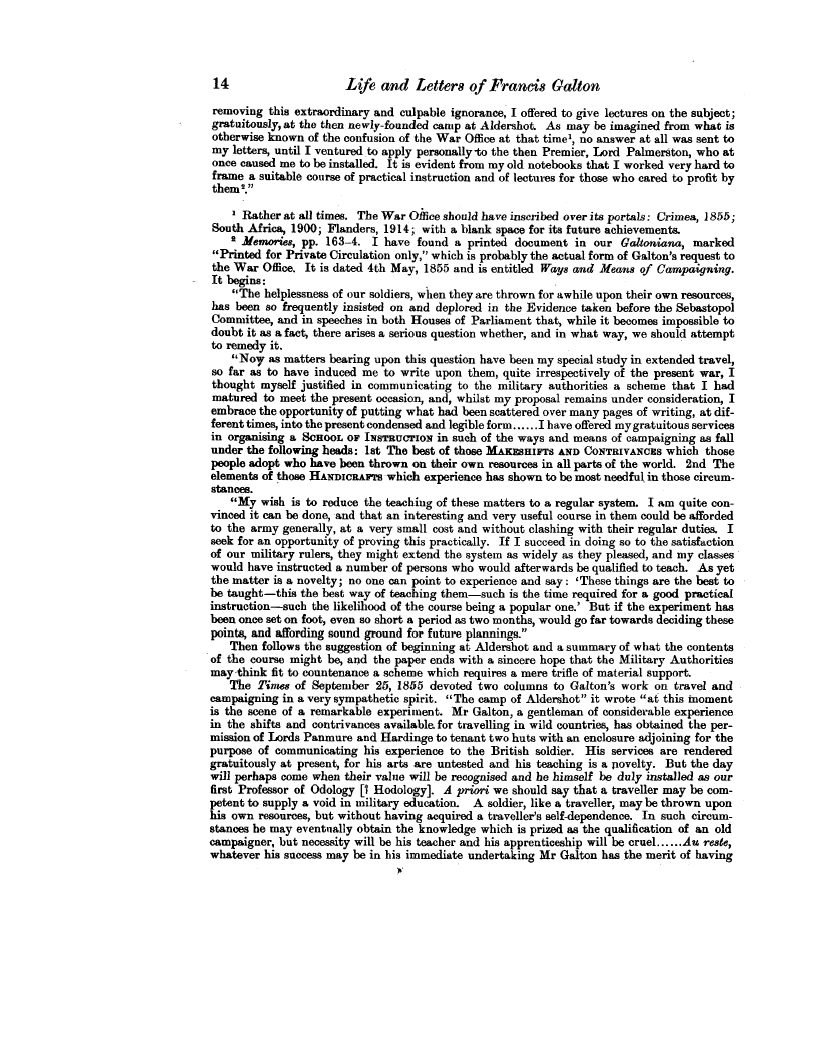14 Life and Letters of Francis Galton
removing this extraordinary and culpable ignorance, I offered to give lectures on the subject; gratuitously, at the then newly-founded camp at Aldershot. As may be imagined from what is otherwise known of the confusion of the War Office at that time', no answer at all was sent to my letters, until I ventured to apply personally -to the then Premier, Lord Palmerston, who at once caused me to be installed. It is evident from my old notebooks that I worked very hard to frame a suitable course of practical instruction and of lectures for those who cared to profit by
them Q."
' Rather at all times. The War Office should have inscribed over its portals: Crimea, 1855; South Africa, 1900; Flanders, 1914; with a blank space for its future achievements.
a Memories, pp. 163-4. I have found a printed document in our Galtoniana, marked "Printed for Private Circulation only," which is probably the actual form of Galton's request to the War Office. It is dated 4th May, 1855 and is entitled Ways and Means of Campaigning. It begins:
"The helplessness of our soldiers, when they are thrown for awhile upon their own resources, has been so frequently insisted on and deplored in the Evidence taken before the Sebastopol Committee, and in speeches in both Houses of Parliament that, while it becomes impossible to doubt it as a fact, there arises a serious question whether, and in what way, we should attempt to remedy it.
"Noy as matters bearing upon this question have been my special study in extended travel, so far as to have induced me to write upon them, quite irrespectively of the present war, I thought myself justified in communicating to the military authorities a scheme that I had matured to meet the present occasion, and, whilst my proposal remains under consideration, I embrace the opportunity of putting what had been scattered over many pages of writing, at different times, into the present condensed and legible form I have offered my gratuitous services in organising a SCHOOL OF INsTRucrIoN in such of the ways and means of campaigning as fall under the following heads: 1st The best of those MAKESHIFTS AND CONTRIVANCES which those people adopt who have been thrown on their own resources in all parts of the world. 2nd The elements of those HANDICRAFTS which experience has shown to be most needful in those circumstances.
"My wish is to reduce the teaching of these matters to a regular system. I am quite convinced it can be done, and that an interesting and very useful course in them could be afforded to the army generally, at a very small cost and without clashing with their regular duties. I seek for an opportunity of proving this practically. If I succeed in doing so to the satisfaction of our military rulers, they might extend the system as widely as they pleased, and my classes would have instructed a number of persons who would afterwards be qualified to teach. As yet the matter is a novelty; no one can point to experience and say: 'These things are the best to be taught-this the best way of teaching them-such is the time required for a good practical instruction-such the likelihood of the course being a popular one.' But if the experiment has been once set on foot, even so short a period as two months, would go far towards deciding these points, and affording sound ground for future plannings."
Then follows the suggestion of beginning at Aldershot and a summary of what the contents of the course might be, and the paper ends with a sincere hope that the Military Authorities may-think fit to countenance a scheme which requires a mere trifle of material support.
The Times of September 25, 1855 devoted two columns to Galton's work on travel and campaigning in a very sympathetic spirit. "The camp of Aldershot" it wrote "at this moment is the scene of a remarkable experiment. Mr Galton, a gentleman of considerable experience in the shifts and contrivances availablee for travelling in wild countries, has obtained the permission of Lords Panmure and Hardinge to tenant two huts with an enclosure adjoining for the purpose of communicating his experience to the British soldier. His services are rendered gratuitously at present, for his arts are untested and his teaching is a povelty. But the day will perhaps come when their value will be recognised and he himself be duly installed as our first Professor of Odology [I Hodology]. A priori we should say that a traveller may be competent to supply a void in military education. A soldier, like a traveller, may be thrown upon his own resources, but without having acquired a traveller's self-dependence. In such circumstances he may eventually obtain the knowledge which is prized as the qualification of an old campaigner, but necessity will be his teacher and his apprenticeship will be cruel Au reste, whatever his success may be in his immediate undertaking Mr Galton has the merit of having

